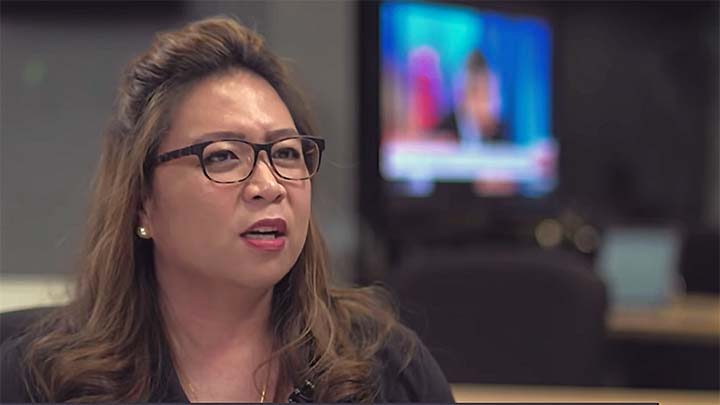SUMMARY
This is AI generated summarization, which may have errors. For context, always refer to the full article.

MANILA, Philippines – Was President Rodrigo Duterte deliberately misinformed by his inner circle about the rice importation issue?
Dismissed Palace undersecretary Halmen Valdez thinks some officials with direct access to Duterte may have been “name-dropping” poor Filipino farmers in order to rile up the President.
“He reacts violently whenever he hears that the poor people are being oppressed. Unfortunately, some people close to the President or who get access to the President will make use of the sentiment of the President,” said Valdez on Monday, April 10, during an interview with Rappler.
“It’s public knowledge that his love for the poor is bordering on obsession. You name-drop the poor, you say the poor are being oppressed, maligned, ‘yung mood niya, talagang gumugulo ‘yung mundo niya (his mood, his world is plunged into chaos),” said Valdez.
She believes this is exactly what happened when some officials brought Duterte up to speed on the issue of rice importation.
True enough, Duterte, during an event with farmers no less, announced he had fired Valdez because he perceived her to be pro-importation, and thus anti-Filipino farmer.
Judging from his statements, he was told that importation should not be allowed because it is disadvantageous to local farmers, whose products cannot compete with the cheaper rice from abroad.
Duterte professes to prioritize the interests of poor Filipinos over that of the “oligarchs” and “elites.”
Who is pro-farmer?
But Valdez said the “poor card” must have been used on Duterte to persuade him to fire her and to reject an extension of deadline for private rice importers.
“We should not abuse the poor card because it’s a very important issue, it’s a policy issue. It is a political commodity, yes, but rice with respect to the poor should be a policy-based approach,” she said.
When he spoke to farmers last Wednesday, Duterte said he fired Valdez because he did not know how to face farmers if he kept an official that supported importation.
But the same official who denied the extension for rice importers, NFA Administrator Jason Aquino, is also pushing for rice importation but through government-to-government transaction.
If Duterte were to prohibit any form of importation, there would be a shortage of rice because the local production of rice is not sufficient to meet the demand of consumers.
Interestingly, Valdez and her former boss, Cabinet Secretary Leoncio Evasco Jr, also advocated that the government prioritize buying rice from local farmers, aside from extending permits given to private importers.
They wanted the NFA buffer stock to be sourced from local farmers while industry stocks would be sourced through private sector-led importation.
Aquino, meanwhile, approved the extension of some private importers and denied the extension of others, while championing government-to-government rice importation at a time when the National Economic Development Authority (NEDA) said there was no need for such a scheme because the recent harvest by Filipino farmers will be enough to supply the NFA buffer stock.
Duterte’s understanding of issue
But it appears that Duterte makes no distinction between these various modes of importation, lumping them up as one and making a blanket declaration that any official who supports importation does not have the best interests of local farmers at heart.
On Monday, it was made even clearer how confused Duterte is about the issue. During a press conference before leaving for Saudi Arabia, he ordered Aquino to prioritize buying rice from local farmers and to only import if needed.
Valdez believes the NFA Council, chaired by Evasco and comprised of agencies like the Deparrtment of Finance and NEDA, should “move heaven and earth” to meet with Duterte at the earliest opportunity in order to apprise him of their take on the issue.
She cautioned the President against trusting the words of Aquino alone instead of the collective wisdom of the NFA Council, an inter-agency committee that decides on NFA policies as a body.
“Council decisions are backed up by hard evidence. NEDA gets data from PSA (Philippine Statistics Authority), from NIA (National Irrigation Administration). They use more sources as opposed to NFA which has only one source: itself,” said Valdez.
She also emphasized that officials who enjoy direct access to the President should not abuse this access.
“It’s the moral obigation of those people surrounding the President to give him the right information, at the right time, [from] the right people,” said Valdez.
While the dismissed official did not name names, Palace sources have pointed to Special Assistant to the President Bong Go as the official facilitating communications between Duterte and Aquino. (READ: Growing rift between Duterte’s trusted men – Jun Evasco, Bong Go?)
He is also the official who supposedly withheld from Duterte a confidential memorandum from Evasco intended to lay down his and the NFA Council’s position on rice importation.
When asked by Rappler about the issue, Go declined to comment. – Rappler.com
Add a comment
How does this make you feel?
There are no comments yet. Add your comment to start the conversation.